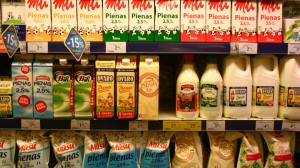
Lithuania's dairy sector is well-developed and Lithuanians pride themselves on the range and quality of their dairy products. Photo by Nathan Greenhalgh.
VILNIUS — The Russian ban on Lithuanian milk products last year, cost the Baltic state’s dairy firms around 100 million litai (€28.9 million) in lost sales and stock, according to the Lithuanian Institute of Agrarian Economics.
In September last year, the Russian government blocked the import of Lithuanian milk products after an antibiotic that is allowed in the European Union but not Russia was found in the milk. An officer allegedly responsible for the mistake lost his job — his name was not released.
In September the veterinary inspectors of Russia visited Lithuania to [private_supervisor]check milk processing enterprises and discovered tetracycline, an antibiotic banned in Russia but allowed in the European Union, in the milk.
“One Lithuanian veterinary inspector had been closing his eyes to the discrepancy of milk to the standards and presence of antibiotics in it for long time. As we know, he has already been dismissed and has been punished,” Alexey Alekseenko, Rosselkhoznadzor press secretary, told Baltic Reports.
By mid-October the border had been reopened to the Lithuanian companies. The ban, which lasted a few weeks in 2009 affected the whole industry, but now products from Rokiškio sūris’ Utenos pienas brand, Pieno žvaigždės’ Panevėžio pienas, Kauno pienas and Pasvalio sūrinė brands, Vikeda, Vilkyškių pieninė, Šilutės Rambynas, Klaipėdos pienas, Žemaitijos pienas, Kelmės pieninė and Lukšių pieninė can be sold in Russia.
Still milking in profits
Though the dairy companies were all forced to lower their domestic prices in 2009, they all reported profits. The Ministry of Agriculture reported to local media that despite the crisis and the Russian export scandal, that the sector had recovered.
The Lithuanian Institute of Agrarian Economics were unable to comment when contacted by Baltic Reports. [/private_supervisor] [private_subscription 1 month]check milk processing enterprises and discovered tetracycline, an antibiotic banned in Russia but allowed in the European Union, in the milk.
“One Lithuanian veterinary inspector had been closing his eyes to the discrepancy of milk to the standards and presence of antibiotics in it for long time. As we know, he has already been dismissed and has been punished,” Alexey Alekseenko, Rosselkhoznadzor press secretary, told Baltic Reports.
By mid-October the border had been reopened to the Lithuanian companies. The ban, which lasted a few weeks in 2009 affected the whole industry, but now products from Rokiškio sūris’ Utenos pienas brand, Pieno žvaigždės’ Panevėžio pienas, Kauno pienas and Pasvalio sūrinė brands, Vikeda, Vilkyškių pieninė, Šilutės Rambynas, Klaipėdos pienas, Žemaitijos pienas, Kelmės pieninė and Lukšių pieninė can be sold in Russia.
Still milking in profits
Though the dairy companies were all forced to lower their domestic prices in 2009, they all reported profits. The Ministry of Agriculture reported to local media that despite the crisis and the Russian export scandal, that the sector had recovered.
The Lithuanian Institute of Agrarian Economics were unable to comment when contacted by Baltic Reports. [/private_subscription 1 month] [private_subscription 4 months]check milk processing enterprises and discovered tetracycline, an antibiotic banned in Russia but allowed in the European Union, in the milk.
“One Lithuanian veterinary inspector had been closing his eyes to the discrepancy of milk to the standards and presence of antibiotics in it for long time. As we know, he has already been dismissed and has been punished,” Alexey Alekseenko, Rosselkhoznadzor press secretary, told Baltic Reports.
By mid-October the border had been reopened to the Lithuanian companies. The ban, which lasted a few weeks in 2009 affected the whole industry, but now products from Rokiškio sūris’ Utenos pienas brand, Pieno žvaigždės’ Panevėžio pienas, Kauno pienas and Pasvalio sūrinė brands, Vikeda, Vilkyškių pieninė, Šilutės Rambynas, Klaipėdos pienas, Žemaitijos pienas, Kelmės pieninė and Lukšių pieninė can be sold in Russia.
Still milking in profits
Though the dairy companies were all forced to lower their domestic prices in 2009, they all reported profits. The Ministry of Agriculture reported to local media that despite the crisis and the Russian export scandal, that the sector had recovered.
The Lithuanian Institute of Agrarian Economics were unable to comment when contacted by Baltic Reports. [/private_subscription 4 months] [private_subscription 1 year]check milk processing enterprises and discovered tetracycline, an antibiotic banned in Russia but allowed in the European Union, in the milk.
“One Lithuanian veterinary inspector had been closing his eyes to the discrepancy of milk to the standards and presence of antibiotics in it for long time. As we know, he has already been dismissed and has been punished,” Alexey Alekseenko, Rosselkhoznadzor press secretary, told Baltic Reports.
By mid-October the border had been reopened to the Lithuanian companies. The ban, which lasted a few weeks in 2009 affected the whole industry, but now products from Rokiškio sūris’ Utenos pienas brand, Pieno žvaigždės’ Panevėžio pienas, Kauno pienas and Pasvalio sūrinė brands, Vikeda, Vilkyškių pieninė, Šilutės Rambynas, Klaipėdos pienas, Žemaitijos pienas, Kelmės pieninė and Lukšių pieninė can be sold in Russia.
Still milking in profits
Though the dairy companies were all forced to lower their domestic prices in 2009, they all reported profits. The Ministry of Agriculture reported to local media that despite the crisis and the Russian export scandal, that the sector had recovered.
The Lithuanian Institute of Agrarian Economics were unable to comment when contacted by Baltic Reports. [/private_subscription 1 year]
— This is a paid article. To subscribe or extend your subscription, click here.












